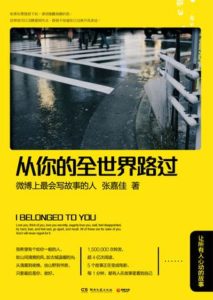See You Tomorrow
摆渡人
Hong Kong/China, 2016, colour, 2.35:1, 128 mins.
Director: Zhang Jiajia 张嘉佳.
Rating: 6/10.
Initially fun but finally exhausting romp through urban bar culture and its emotionally wrecked denizens, produced by Wang Jiawei [Wong Kar-wai].
Shanghai, the present day. Chen Mo (Liang Chaowei) and Guan Chun (Jin Chengwu) own a wild bar called 摆渡人 (“The Ferryman”), aka See You Tomorrow, in Qilianshan Road, aka Bar Street. One of its neighbours is Xiaoyu (Yang Ying), who leads a demonstration by locals against the noise. She idolises one of its customers, faded alcoholic pop singer Ma Li (Chen Yixun), whose longtime girlfriend Jiang Jie (Xiong Dailin) openly flirts with the opportunistic Jack (Sheng Jian). Despite his easygoing, philosophical nature, Chen Mo is in poor health and has been ordered to wear a health bracelet by his doctor. Chen Mo still bears the emotional scars of his relationship 10 years ago with He Muzi (Du Juan), a champion barwoman whose speciality  was the knockout drink See You Tomorrow 明天见; she finally agreed to date him but eventually their paths diverged. Ten years or so ago Guan Chun also had an infatuation – with Maomao (Zhang Rongrong), the tomboy daughter of a master pancake-maker from Taiwan (Xiang Xi) who had opened a shop on Bar Street but later moved away with his whole family. Guan Chun hears that Maomao has returned and wants to carry on her father’s reputation. Unfortunately, her pancakes are terrible. Guan Chun tries to help her with a promo campaign but almost wrecks his bar’s finances in the process. Meanwhile, Xiaoyu returns from her DJ job one night to find Ma Li drunk on her doorstep: he’d finally proposed to Jiang Jie after six years but she’d turned him down. Xiaoyu remembers how she first fell for him as a young girl when he was starting out as a teenage singer (Lu Han). To help him regain his self-esteem, she looks after him and arranges a comeback concert. Meanwhile, Chen Mo tries to help the relationship between Maomao and Guan Chun by improving her cooking skills. And Xiaoyu finds herself in an epic drinking contest with Jiang Jie after a fight over the now-successful Ma Li.
was the knockout drink See You Tomorrow 明天见; she finally agreed to date him but eventually their paths diverged. Ten years or so ago Guan Chun also had an infatuation – with Maomao (Zhang Rongrong), the tomboy daughter of a master pancake-maker from Taiwan (Xiang Xi) who had opened a shop on Bar Street but later moved away with his whole family. Guan Chun hears that Maomao has returned and wants to carry on her father’s reputation. Unfortunately, her pancakes are terrible. Guan Chun tries to help her with a promo campaign but almost wrecks his bar’s finances in the process. Meanwhile, Xiaoyu returns from her DJ job one night to find Ma Li drunk on her doorstep: he’d finally proposed to Jiang Jie after six years but she’d turned him down. Xiaoyu remembers how she first fell for him as a young girl when he was starting out as a teenage singer (Lu Han). To help him regain his self-esteem, she looks after him and arranges a comeback concert. Meanwhile, Chen Mo tries to help the relationship between Maomao and Guan Chun by improving her cooking skills. And Xiaoyu finds herself in an epic drinking contest with Jiang Jie after a fight over the now-successful Ma Li.
REVIEW
The name on the can may be that of Zhang Jiajia 张嘉佳 – a Mainland writer making his directing debut – but to all intents and purposes See You Tomorrow 摆渡人 is the latest film by veteran auteur Wang Jiawei 王家卫 [Wong Kar-wai], 58, who’s technically billed as just producer and co-scripter. Wang’s first movie since The Grandmaster 一代宗师 (2013), it’s a two-hour celebration of bar culture and the emotionally wrecked denizens who inhabit it – and like several of his films (Chung King Express 重庆森林, 1994; 2046, 2004) is centred on a particular location. Set in Wang’s birthplace of Shanghai (and shot in the Mainland, in Mandarin), it has his DNA all over it, from the cultural jackdaw-ism through the stylistic overkill to the emotional shallowness beneath all the pop-philosophy and retro-melancholy. Funny and entertaining for the first 45 minutes, as the three main stories are set up, it rapidly loses its shine during the next 80 as the characters go nowhere and Wang and Zhang construct one after another more excessive setpiece, climaxing in an epic drinking contest between two women. By then the audience is as satiated and exhausted as the participants.
 Jiangsu-born Zhang, 36, was lead writer on costume comedy The Butcher, the Chef and the Swordsman 刀见笑 (2010) and sole writer on the charming rom-com I Belonged to You 从你的全世界路过 (2016). The latter was adapted from his best-known work of the same title, a collection of 30-odd short stories originally published online during 2013 and in book form later that year. It’s from that same collection that the source material for Tomorrow is drawn – the short story 摆渡人 (literally, “The Ferryman”) – though the finished film bears little relationship to it, apart from a few characters’ names. Reportedly, Zhang wrote 118 drafts of the screenplay, expanding a (very) short story to many times its length by adding in characters and backgrounds. The film was announced in Jan 2015 as the first film project of Alibaba Pictures, and shooting took an enormous 10 months, from Jul 2015 to May 2016. Bookending the whole experience, Zhang had two heart attacks, in Nov 2014 and Jul 2016, suffering from Wolff-Parkinson-White Syndrome.
Jiangsu-born Zhang, 36, was lead writer on costume comedy The Butcher, the Chef and the Swordsman 刀见笑 (2010) and sole writer on the charming rom-com I Belonged to You 从你的全世界路过 (2016). The latter was adapted from his best-known work of the same title, a collection of 30-odd short stories originally published online during 2013 and in book form later that year. It’s from that same collection that the source material for Tomorrow is drawn – the short story 摆渡人 (literally, “The Ferryman”) – though the finished film bears little relationship to it, apart from a few characters’ names. Reportedly, Zhang wrote 118 drafts of the screenplay, expanding a (very) short story to many times its length by adding in characters and backgrounds. The film was announced in Jan 2015 as the first film project of Alibaba Pictures, and shooting took an enormous 10 months, from Jul 2015 to May 2016. Bookending the whole experience, Zhang had two heart attacks, in Nov 2014 and Jul 2016, suffering from Wolff-Parkinson-White Syndrome.
Without wishing to underplay Zhang’s contribution – he’s reported to have said he wanted to make “a Wang Jiawei film in the style of Zhou Xingchi [Stephen Chow]” – Wang’s contribution appears to have been considerable. On just a shooting level, Tomorrow is extremely complex, with thousands of individual setups, little conventional cross-cutting, and multiple stylistic swings and visual parodies. Two skilled directors of photography are credited – Hong Kong veteran Bao Dexi 鲍德熹 [Peter Pau] (Crouching Tiger, Hidden Dragon 卧虎藏龙, 2000) and China’s Cao Yu 曹郁 (City of Life and Death 南京!南京!, 2009; Driverless 无人驾驶, 2010) – but as a complete package Tomorrow is way beyond the capabilities of any first-time director with no previous experience.
Zhang’s short story centred on one character, a quiet young woman from the northeast called Xiaoyu and, via a narrator friend who calls himself a “ferryman”, her interest in a painter called Ma Li who’s married to a woman called Jiang Jie. The script of Tomorrow preserves the names but makes Xiaoyu much less gentle, Ma Li a washed-up, alcoholic pop star, and Jiang Jie his flirty longtime girlfriend. Beyond them, the screenplay also spreads the net much wider, shifting the centre to Chen Mo and his pal Guan Chun, owners of a wild bar called The Ferryman 摆渡人 in Chinese and See You Tomorrow in English, and making the seemingly laidback Chen Mo into the “ferryman” himself, a man who helps solve people’s emotional problems.
In fact, Chen Mo is a slowly dying man who wears a health bracelet and has a chequered emotional past of his own – including an infatuation with a champion barwoman, enigmatically played by Du Juan 杜鹃 (who ironically was also in I Belonged to You) in one of the film’s wittiest flashback sequences. The relationship between Xiaoyu and Ma Li is reduced to just one of several strands in the film – all of which, in typical Wang fashion, end sadly and also include Guan Chun’s mad crush on Maomao, a tomboy Taiwan chef who cooks the worst pancakes in the East.
The theme of Chen as a “ferryman” isn’t properly developed, despite actor Liang Chaowei 梁朝伟 [Tony Leung Chiu-wai], now in his mid-50s, being perfect casting for such an avuncular role. Alas, after being introduced at the start, the Hong Kong star (and Wang regular) is mainly relegated to being a voice-over narrator, dispensing fortune-cookie-like observations on life and the universe to the audience. Instead, the movie becomes once crazy setpiece or parody after another – the Wang equivalent of a Chinese New Year film – as it yoyos between the Xiaoyu/Ma Li and Guan Chen/Maomao stories. Thus, we get Taiwan actor Jin Chengwu 金城武 [Kaneshiro Takeshi] in an MV spoof of yakuza movies that’s as much about the actor as the subject; China’s Yang Ying 杨颖 [Angelababy] and ex-boybander Lu Han 鹿晗 in an MV spoof of first-love movies (ditto); and Jin and Taiwan’s Zhang Rongrong 张榕容 [half-French Sandrine Pinna] in a slapstick spoof of food movies. Throw in regular brawls, season with lots of cameos – Hong Kong’s Li Canchen 李璨琛 [Sam Lee] as a gangster, Mainland singer Li Yuchun 李宇春 as a tough tomboy, Taiwan veteran Jin Shijie 金士杰 as a master pancake chef, and so on – and simmer gently under neon, fairylights and eye-catching sets and photography for two hours.
Despite his undernourished role, Liang still anchors the film with another quietly masterful performance amid all the hysteria, and looks much more at home than he did as the lead in The Grandmaster. Jin largely buffoons around; Hong Kong’s Chen Yixun 陈奕迅 [Eason Chan] pops up now and then as the alcoholic singer Ma Li but doesn’t create much of a character; and Ying works hard to keep up with all the seasoned male talent. Letting her hair down in a fun way is Zhang, as the tattoo-ed tomboy chef – a wild performance from an actress more often seen in glummer indie fare.
Though Tomorrow is technically set in Shanghai – with Bar Street like a cross between the real city’s Yongkang Lu and Hengshan Lu – it’s actually, like all Wang’s films, set in a city of his imagination – part pre-modern Shanghai, part oldstyle Hong Kong, part pop-culture clothesline. There’s no sense of any geography to the street, and almost none of the metropolis is seen, despite much talk by Chen Mo of “this city”. Like Casablanca, it exists only on the backlot. Though the DPs are new to the team, art director Qiu Weiming 邱伟明 [Alfred Yau] is a Wang veteran, and the design simply oozes atmosphere, especially with so much close and medium-shot camerawork. Despite all the gallons of alcohol consumed – drinking currently being the acceptable face of indulgence – it’s notable that no tobacco is seen on-screen, proving that even major auteurs are not immune to the unstoppable tide of political correctness.
CREDITS
Presented by Alibaba Pictures (CN), Jet Tone Film (HK), Hehe (Shanghai) Pictures (CN), Union Pictures (CN), Taobao (CN). Produced by Jet Tone Film (HK).
Script: Zhang Jiajia, Wang Jiawei [Wong Kar-wai]. Short story: Zhang Jiajia. Photography: Bao Dexi [Peter Pau], Cao Yu. Editing: Hu Dawei [David Wu]. Art direction: Qiu Weiming [Alfred Yau].
Cast: Liang Chaowei [Tong Leung Chiu-wai] (Chen Mo), Jin Chengwu [Kaneshiro Takeski] (Guan Chun), Chen Yixun [Eason Chan] (Ma Li), Yang Ying [Angelababy] (Xiaoyu), Zhang Rongrong [Sandrine Pinna] (Maomao), Du Juan (He Muzi), Xiong Dailin (Jiang Jie), Da Peng [Dong Chengpeng] (Hu), Ma Su (Sao), Cui Zhijia (Xiaoma), Jia Ling (fat woman), Li Canchen [Sam Lee] (Shanji Ge), Liu Yan (female customer), Jin Shijie (Pancake God), Li Yuchun (Shisan Mei), Lu Han (young Ma Li), Zheng Kaiyuan (Lu), Dabao [Wu Yixuan] (young Xiaoyu), Sheng Jian (Jack, Jiang Jie’s friend), Xiang Xi (Pancake King, Maomao’s father), Cao Kefan (hotel manager), Ou Di, Na Dou [Lin Yuzhi] (rock singers), An Youqi (crying female customer), Ke Jiayan (female customer with glasses), Hua Tailang, Mao Junjie (customers).
Release: China, 23 Dec 2016; Hong Kong, 29 Dec 2016.
